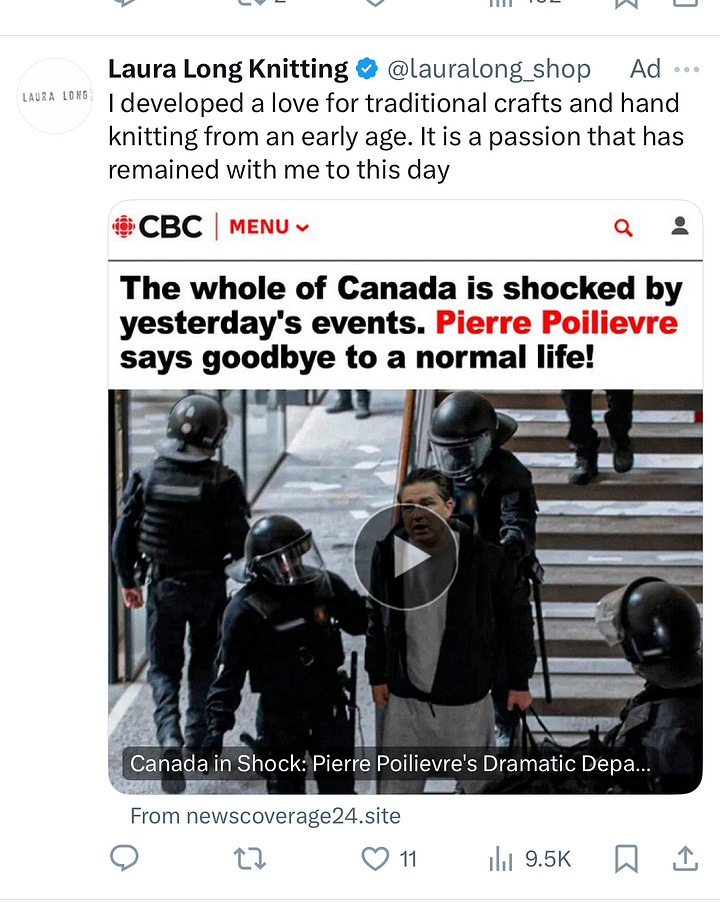The closest I ever came to going viral on Twitter came at an Olympics. This was in Brazil in 2016, back when Twitter was very much still a Thing. The whole episode was silly, but it was proof of Twitter’s influence at the time that the story of a bunch of Brazilians swearing at me in Portuguese was covered by Buzzfeed and the Huffington Post.
My only other experience with something like that came at another Olympics, in Tokyo in 2021. This one was a little weird. I was on a media bus and saw a lady on the sidewalk riding a bike that had one kid in a seat behind her and another on a seat on the handlebars. I took a photo. I tweeted it, with the caption, ‘Very efficient transport.’
That was it. I do not claim that this was ground-breaking journalism. Within a few hours it became clear that a lot of Japanese people found tweet this interesting. The tweet had thousands of interactions, and I had to turn off my notifications for probably the first time since Brazil. The significant difference was that this time no one was mad at me. Or, at least, few people were. Most of the reaction was from people who were pleased that this foreigner liked their bikes. It was retweeted with comments like ‘Canadian journalist LOVES pedal bike!!!!’. Which seemed like an overstatement, if we’re honest, but whatever. Multiple Japanese journalists contacted me to ask if it could be used in a story. (“Uh, sure?”) One of them, and I swear I am not making this up, said they wanted to include it on a television documentary about the Tokyo Olympics.
The whole thing was surreal, partly because I could never really understand why the locals took so much interest in a three-word tweet, but mostly because, by 2021, Twitter had long since stopped being influential. Tweets just didn’t blow up anymore. Like a lot of journalists, I still tweeted somewhat regularly at the time, but there was much less interaction with any of it. We were mostly talking to each other.
And then Elon Musk bought it and made it so much worse.
A lot of people are fleeing the platform now on what I guess you would call moral grounds, having decided they don’t want to be part of a business owned by someone who has aligned himself so closely with Donald Trump and his isolationist, anti-immigration policies. I stopped tweeting much at all many months ago, before Musk’s Trump swerve, mostly because he seemed to actively want the place to become more racist and homophobic. It just felt gross.
But I’m bailing on it completely now because Twitter is just incredibly broken. It is a platform for people who pay to use it, amplifying their posts and suppressing those from users who do not, with the result being that there’s basically no engagement on anything that doesn’t involved the paid-for blue check. Before this system was implemented, you used to be able to search for something and find first-hand sources for it. Now, anything that might be useful is buried under a mountain of blue-check nonsense, often from accounts that are intentionally posting bullshit because that stuff can still go viral and they will make money from it. (One of Musk’s other changes is that high-engagement users get paid, regardless of whether their posts are truthful, racist, whatever. Just get clicks and make bank.) Twitter also suppresses posts with links to other content now, which was killed one of the main reasons it was useful to anyone with a professional reason for being on the site.
Musk’s fans think all of this is brilliant, as he’s making the site More for Them, but the business case sure doesn’t seem to be working. Blue-chip advertisers have left and are not returning, and a random scroll now brings up the kinds of ads that look to have been purchased on the cheap.




The image in the bottom right is also a Musk Special: straight-up bullshit, in this case a fake CBC story that purports to show Pierre Poilievre in handcuffs.
Twitter simply doesn’t work anymore, unless you want to use it for the purposes for which it is now designed. Probably the first clue that this was the endpoint was Musk’s renaming the site to X, which has to be the least successful corporate rebranding in history. Like, did he want to drive people away? Did he want to flush his investment down the can?
Recently, there’s been something of a mass exodus among journalists and media types to Bluesky, a Twitter-like platform, and I’ve set up an account there, but it is early days. It’s quiet over there, and it will take a lot of growth to become anything like the Twitter of old. But you are much less likely to get yelled at, which is nice.
Apologies to Brazil in advance.
Mid-week reading
The College Football Playoff is set, and it has, not surprisingly, created much angst and hair-pulling frustration. But lost in the controversy is the fact that this thing has fundamentally changed the sport. I considered What It All Means for theScore.
And, in Other Things Published Elsewhere, I wrote for the Toronto Star on Trump’s troll-job of “Governor” Justin Trudeau. Might as well get used to it.





